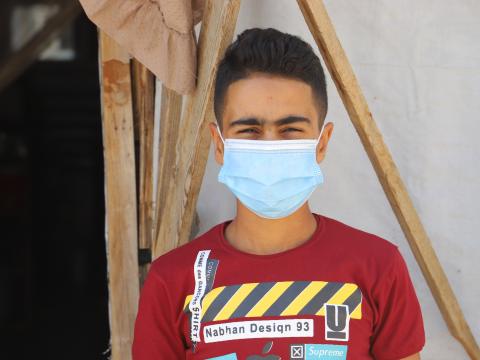
COVID-19: Kids are smart. Listen to them.
By Venita Popovic and Claudia Bade
Children and their opinions are so often dismissed by adults. Even we, with our years of working for a child-focused agency, can forget how smart children are, how they have valid opinions about their lives, communities and the world around them. Thankfully, World Vision is serious about child participation, and our colleagues frequently talk to girls and boys to hear and understand what they think about the challenges of poverty and the solutions we propose. It is dangerous not to—it is all too easy to get things wrong if you do not take time to listen to the people you are serving.
Listening during a pandemic
Despite the challenges of COVID-19 lockdowns and limited mobility, we were determined to hear from them about this latest threat to their lives and flourishing. So, during the summer, we connected with them in a variety of safe ways to hear how the pandemic affected them and what they thought about their country’s response. In our region, the Middle East and Eastern Europe we surveyed more than 760 children from 12 countries. Knowing how smart children are, we were still stunned at the wisdom of their responses.
What did they say?
One third of surveyed children think their governments could have done better in responding to pandemic. Many believed health care should be free and comprehensive for infected people others called for food prices to be regulated.
Many children wanted schools reopened or providing alternative lessons via TV and radio. A Lebanese girl urged the president to reopen the schools: “We don’t want to lose our future.” A major concern was the increase in violence against children cause or aggravated by the coronavirus pandemic. One child told us, “There are laws that protect children why aren’t they obeyed?”
Children’s opinions confirmed
At the same time when World Vision released its Act Now For Children report, another agency was focusing on how aid is changing during pandemics(1). Amazingly, quite a few overlap with what our children intuitively already knew: significant amounts have been invested in health sector, but there is little evidence that these funds have reached the poorest countries and those most in need. Also that COVID-19 funding commitments came at the expense of other sectors such as social protection, water and sanitation, agriculture, peacebuilding…Only investment in the education sector remained stable or slightly increased.
They have hope in you.
The strength of our report is fuelled by listening to the children—not just their concerns, but also their hopes. The research spotlights the unbreakable spirit of girls and boys from the Middle East and Eastern European region. Against all odds, they are hopeful for the future.
That hope, that faith that service providers will protect their present and futures, must be honoured by those in positions of power. Governments must fulfil their duty to provide essential services especially to their poorest and the most vulnerable, not only in the time of pandemic, but also once the crisis has passed. Donors and non-governmental actors should do all they can to enable the governments of poor, instable and fragile countries to meet the needs of all children and young people in their care—whether nationals or displaced peoples.
Children are smart. They know what needs to be done. Let us show them adults are smart too, smart enough to protect those in their care.
Read World Vision's Act Now report for the Middle East and Eastern Europe region here. And the global report here.
By Venita Popovic and Claudia Bade work in the Resource Development Unit for World Vision’s Middle East and Eastern European office.
(1) Development Initiatives https://devinit.org/resources/how-aid-changing-covid-19-pandemic/
